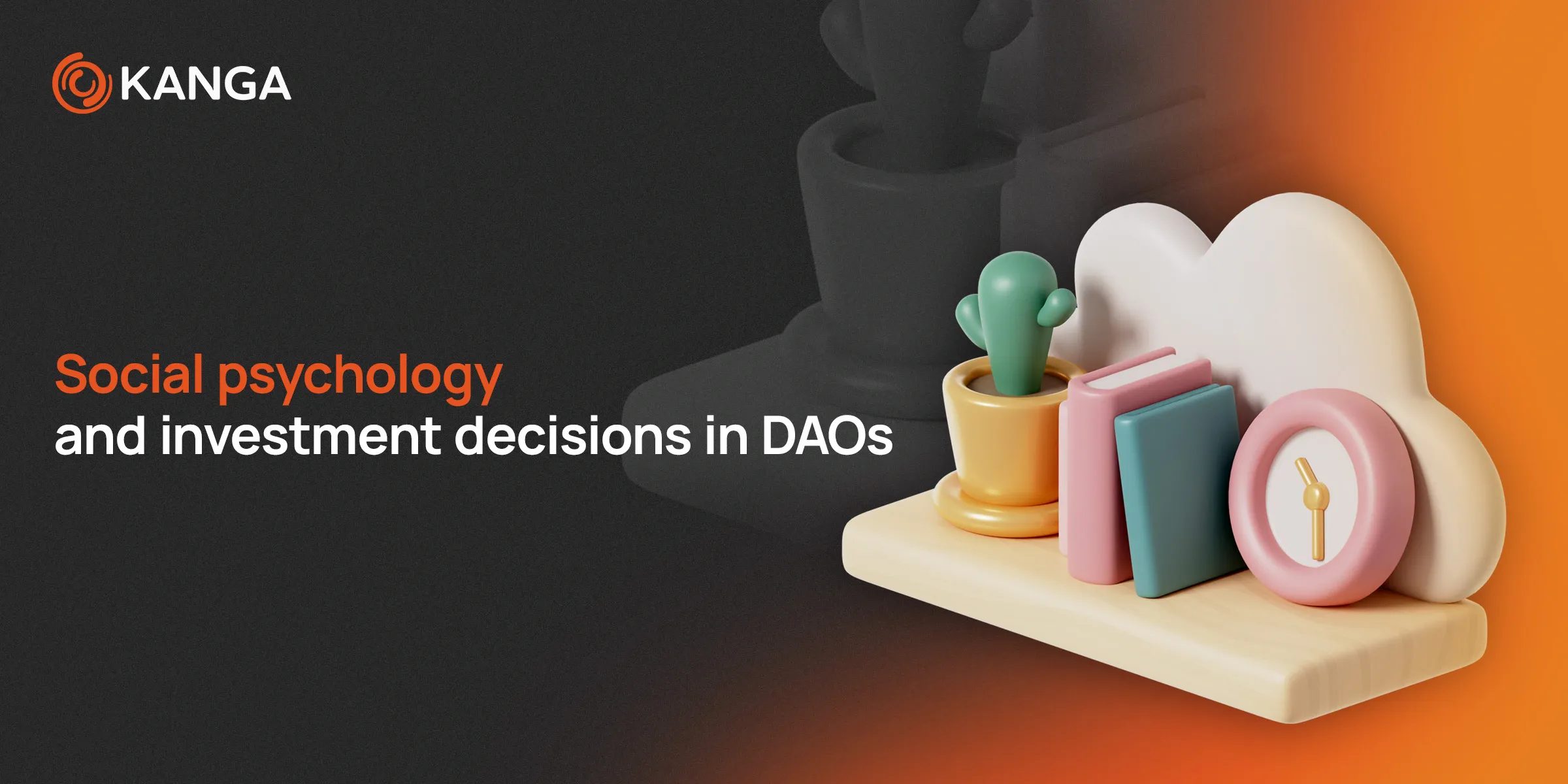Social psychology and investment decisions in DAOs

Written by
Zuzanna Krychowiak
Published on
Imagine a world where investment decisions are not dictated by a few influential analysts or financial magnates, but by a community of people united by a common goal. In the world of cryptocurrencies and blockchain technology, this world is a reality thanks to DAOs (Decentralized Autonomous Organizations). But how does social psychology affect these decentralized group decisions? Is the “wisdom of the crowd” the key to success, or a recipe for disaster? Let’s dive into the world of DAOs to discover how human behaviors influence the waves of the cryptocurrency market.
DAOs – a revolution in decision making
DAOs, or Decentralized Autonomous Organizations, are not just a new form of organization. They’re a true “game changer” in decision-making. They transform the foundations of management and control, allowing every community member to influence the direction of the organization’s development. In DAOs, direct democracy reaches a new dimension, where blockchain serves as a reliable witness to every vote, ensuring transparency and fairness in the process.
Moreover, DAOs can function without a central point of control, meaning they are less susceptible to human errors or manipulations by individuals. This is especially important in the financial context, where DAOs manage significant assets. For example, one of the first and largest DAOs, The DAO, gathered the equivalent of over 150 million dollars in ether during its debut in 2016. Although a subsequent hacker attack revealed some weaknesses in its code, this event was an important lesson for future DAO projects on the importance of security and transparency.
The crowd psychology in action
In DAOs, social psychology becomes both a driving force and a potential source of weakness. The phenomenon of “wisdom of the crowd,” popularized by James Surowiecki’s work, is based on the assumption that a group of people can make decisions leading to better outcomes than the actions of individual experts, provided there is diversity, independence, and decentralization of decisions. In practice, in a DAO, where everyone has the opportunity to express their opinion, theoretically, optimal solutions can be achieved.
However, as studies in social psychology show, people acting in groups are prone to a series of cognitive errors. The herd effect, where people mimic the decisions of other group members without deeper analysis, is a common phenomenon in investment environments, including DAOs. This can lead to a speculative bubble, and ultimately a crash, when investors suddenly realize that the value of their investment was overestimated.
Furthermore, group pressure may cause DAO members to vote in line with the majority, even if their own analysis suggests a different action. The echo chamber effect, a situation where only similar opinions dominate and are amplified within a closed group, can further limit the ability to think critically and innovate.
Spectacular successes and failures
Delving into the history of DAOs, we encounter many fascinating stories that show how social psychology can shape cryptocurrency markets. The case of The DAO in 2016 is often cited as a key moment for the Ethereum ecosystem and the cryptocurrency world in general. The gathering of over 150 million dollars in ether and the subsequent hacker attack drew attention to the importance of security in smart contracts and how community reactions to a crisis can affect investment decisions. The fear of losing funds caused a massive sell-off of ether, showing how emotions can lead to sudden price changes.
On the other hand, DAOs can also result in spectacular successes. Consider the phenomenon of collective investments in NFTs. Groups like Flamingo DAO, focusing on the purchase of digital art and other non-fungible tokens, show how decentralized decision-making can yield significant profits. Their investments in digital art, often bought for relatively low amounts, have increased in value, sometimes reaching millions of dollars at auctions. This is proof that decentralized decision-making, based on diverse perspectives and knowledge of members, can lead to discovering value where others do not see it.
Lessons from DAOs, or finding a balance between enthusiasm and caution
From these stories, an important lesson about the need to maintain a balance between enthusiasm and caution in DAOs emerges. Social psychology plays a key role here, as emotions and group behaviors can influence investment decisions. Understanding how group dynamics affect decision-making is important for how we manage risk and maximize potential profits.
How to achieve balance in the world of DAOs?
- One way to achieve this balance is by diversifying the investment portfolio of a DAO. Investing in a wide range of assets can help reduce the risk associated with improper group decisions.
- Additionally, promoting openness and diversity in discussions within DAOs can prevent the echo chamber effect, ensuring that different viewpoints are considered.
- As we explore these new forms of organization, it is important that we learn from past experiences, both positive and negative.
Wisdom or madness of the crowd?
DAOs represent an exciting experiment in direct democracy and collective decision-making. Social psychology plays a key role in them, showcasing both the potential of the “wisdom of the crowd” and the risks associated with the herd effect. As we explore this new landscape, it’s important to remember that every decision reflects human nature – with all its weaknesses and strength. Are DAOs the future of investing? Only time will tell, but one thing is for sure – in the world of DAOs, everyone has a voice, and that in itself is a revolution.